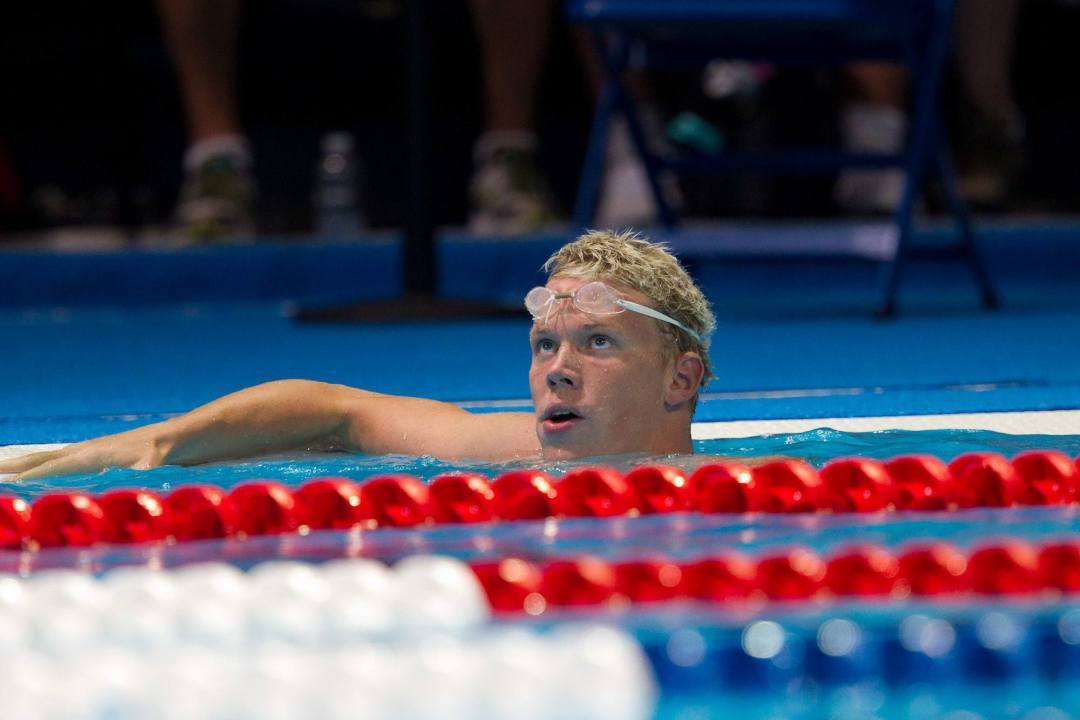Olivier Poirier-Leroy is a former national level swimmer based out of Victoria, BC. In feeding his passion for swimming, he has developed YourSwimBook, a powerful log book and goal setting guide made specifically for swimmers. Sign up for the YourSwimBook newsletter (free) and get weekly motivational tips by clicking here.
The holidays are here, and you know what that means! Holiday training camp, watching Elf on repeat, and of course, getting sick!
Swimmers have it twice as bad this time of year. Not only is it cold-and-flu season for everyone else, but we are gearing up to do some of our hardest training of the year, a period that leaves us more susceptible to illness.
In fact, a French study found that top swimmers were 50-70% more likely to fall ill during heavy bouts of work in the pool.
The 1-2 combo is leaving many swimmers sidelined and wondering whether they can train or not. Or rather, whether they should be training or not.
The answer isn’t clear-cut, and depends on the severity of the symptoms you are experiencing. Ebola? Yeah, you should probably be staying home. Common cold? That’s where things get tricky.
Is training while I am sick dangerous or going to make me sicker?
Again, it depends on the type of symptoms you are showing, but some research done at Ball State on the most frequently contracted form of the common cold (rhinovirus-caused upper respiratory illness) found that exercise of mild intensity didn’t change the severity or duration of the cold, either for worse or for the better.
Thomas Weidner, Ball State’s head of athletic training, performed research where he (rather controversially) inoculated a group of otherwise healthy subjects with the common cold and found that moderate exercise (duration and intensity: 40 minutes at 70% max heart rate) actually helped participants feel better even if the symptoms didn’t actually decrease (or increase, it should be added).
Weidner’s rule-of-thumb is if your symptoms are “above the neck”—runny nose, congestion, sore throat—you are most likely safe to perform some mild intensity exercise.
In another study done by Dr. Neil Walsh at Bangor University, he found that the oft-cited advice that a sick athlete should not engage in high-intensity training as it is thought to suppress immune function (and thereby increase the duration of the illness) is misguided.
Subjects who performed 30 minutes of treadmill running at approximately 80% intensity were shown to have no decrease of immune response, while subjects who did two hours of slow paced exercise did experience a decline in immune function.
Between the two studies we can consider that doing some form of exercise is not going to effect the immune response of an athlete with a common cold, regardless of whether the exercise is high intensity or not, simply as long as the effort is not carried out over an extended period of time.
(A theory for why extended exercise impacted the immune system was that blood stress hormones—cortisol being one of them—act to briefly disrupt the immune response.)
But should I be swimming?
Well, this is where things get muddy.
I know there are swimmers out there that will go to practice regardless of how they are feeling (there was one such gentleman at the YMCA yesterday, who I overheard unleashing mucus tornadoes into the water), and there are also coaches who won’t accept anything short of a missing limb as an excuse to miss a workout.
We have all had swimmers on our team or in our group that persisted with showing up to workouts even though they were sneezing and hacking their brains out. While it is a bit of an unspoken and disgusting reality that swimmers do in fact urinate in the pool, it is quite another thing to have a lane-mate blowing his nose into the gutter or in the water mere feet from you.
Simply because research has demonstrated that you won’t get sicker, and although the chlorine in a properly-treated pool should kill the mucus flying out of your nose, doesn’t mean that you should be going to practice and using the pool as a Kleenex.
Take Your Swimming to the Next Level
 YourSwimBook is a log book and goal-setting guide designed specifically for competitive swimmers.
YourSwimBook is a log book and goal-setting guide designed specifically for competitive swimmers.
It includes a ten-month log book, a comprehensive goal-setting section, monthly evaluations to be filled out with your coach, and more.
👉 Learn 8 more reasons why this tool kicks butt now.
Join the YourSwimBook weekly newsletter and get motivational tips and more straight to your inbox.

Hi my daughter is suffering from a cough should she go swimming?
If a swimmer is sick, and they still go to practice, the best thing to do is,
1. have the swimmer swim a few laps.
2. get them out.
3. call their parent
now, let me say this. do not, send the kid home with a stuffy nose. then, they will not do good at meets, and spend their time, instead of being in the pool, playing games all night. but, still send them home when there is puke in the deep end/ any where.
There are times when the swimmer must make decisions too. I get that parents feel the need to control their child’s swimmjng but lay off. If the kid is determined to swim and can be courteous at practice let them go. If they’re contagious it becomes more of a parents common sense but the kids have to decide something too.
In my opinion, there are certain times when you absolutely should not get in the water:
1. When you have a fever
2. Within 24 hours of the fever ending
3. If you have vomiting or diarrhea
4. Within 24 hours of said gastrointestinal distress symptoms ending
5. When you just got diagnosed with a bacterial infection (like strep throat, for example) of some sort and it’s been less than 24 hours that you’ve been on antibiotics.
6. If you have a MRSA infection
7. Severe chest illness like pneumonia – get your butt back in bed. At a recent swim meet, a stupid parent let his teenager swim a distance event and the… Read more »
I’d add rabies to the list.
One day – some kid in college will be getting his doctorate on this matter in exercise sciences to determine IF other swimmers get sick from swimming in the pool and swallowing all the other mucus from the swimmers who are hacking, coughing, or blowing out their nose – or if the chlorine is enough to kill infectious bacteria so it has no impact.
I’ve always felt as a coach that – if a kid is sick – am I really going to get the best out of them today? Are we not better off resting the body? If we continue to weaken the body – how long will the recovery be?
This isn’t a SEAL unit. Sometimes a BREAK… Read more »
Try actually talking to a physician, or better yet, an epidemiologist. If you’re sick due to something infectious/contagious, you really don’t belong out in the public, and especially at a Petri dish like swim practice. Stay home, rest, get past the contagious stage, and then return. It’s a common courtesy to your peers that share the world with you – they don’t really want to be sick too, because precious you couldn’t miss a couple of days of practice.
I’ve gone through all of your comments on here. Coming from a Former collegian swimmer, and now Coach, I’m going to guess that most of these comments are from parents. And let me just put it out there that you are all WRONG. I myself was a go to practice at every time(swam my first high school meet with a broken elbow and won I don’t suggest this lol). Swimming while sick can be the best practice for your kid out of anything that they will ever do including holiday training.
1. It forces you to swim in the worst conditions. Things that you can not under any circumstance recreate unless you are sick.
2. It helps sweat out… Read more »
I completely agree with you. I have friends whose parents have them stay home from practice because they have a bit of a runny noss or were up past 11. When we get older, those aren’t going to be excuses to miss work, so use them as excuses now?
I’ll be the first to admit, I’ve probably swam a few times when I shouldn’t have because I hate missing practice or meets. However, I think swimmers way too often use just a slightly runny nose to miss practice, and this is coming from soneone who had to have sinus surgery becuase of a really bad cold.
If it’s a cold, come to practice
You wouldn’t have sinus surgery because of a really bad cold…it would be called a sinus infection. And I’m assuming you had them fairly often or I doubt that you would’ve needed surgery. Sinus infections are more serious then colds.
Paging Dr. Swimfish87. If you’ve discovered a way to “sweat out a virus”, please pick up your Nobel Prize on the way out the door.
I have a high fever and tomorrow I have to go swimming should i go